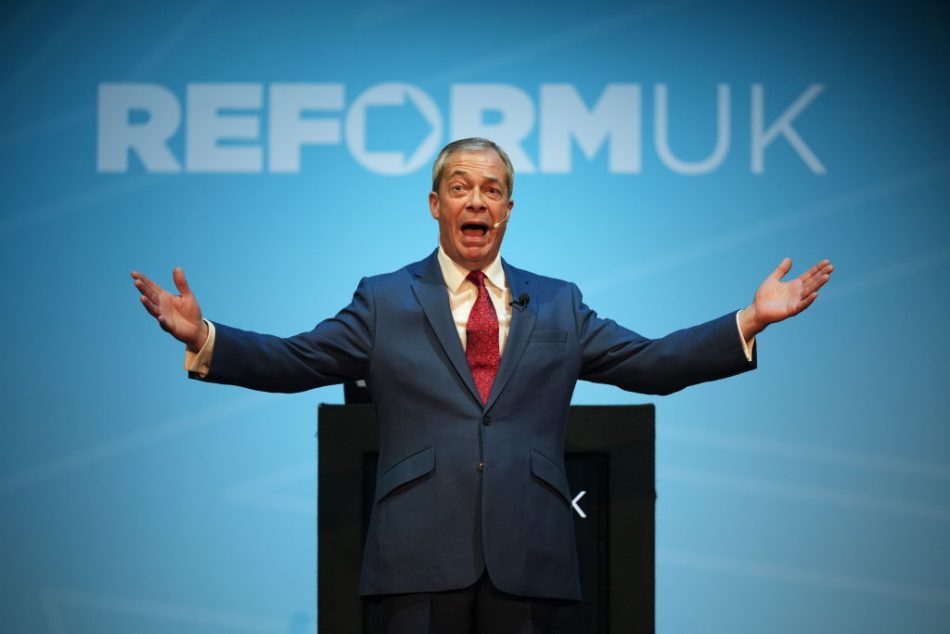The Turquoise typhoon that is Reform UK has swept through the English council and mayoral elections – and winning by just six votes the first by-election of this Parliament in Runcorn and Helsby, hitherto in Labour’s 50 safest seats. As Labour narrowly held off the Reform challenge in closely fought mayoral contests in the West of England, North Tyneside and Doncaster, the main losers of the day were Kemi Badenoch’s Tories, who are on course to lose more than half the council seats they were defending.
The Tories are caught in a pincer movement
In the Brexit stronghold of greater Lincolnshire, Dame Andrea Jenkyns, a former Tory minister who has defected to Reform, is to be the area’s new Mayor, and nearby Hull is also heading into Reform’s mayoral column. In a notably bitter victory speech, Dame Andrea accused her old party of importing dirty tactics from the US in an unsuccessful attempt to smear her.
A grinning Reform leader Nigel Farage, standing with Sarah Pochin, Reform’s victor in Runcorn,and another former Tory, proclaimed that Reform were now the real opposition to Labour and that those still voting Tory often just helped Labour win. As the results come in throughout the day, the story will be the giant swings from the two old parties towards Farage’s ‘people’s army’ and the arrival of five-party politics, with the Lib Dems and Greens also gaining more ground, and consolidating their hold in local government.
Just ten months after Labour’s sweeping general election win, the reaction against them is striking, with double-digit swings against the party across the country where elections were held. This reflects the unpopularity engendered by their policies, like scrapping winter fuel payments for pensioners, the rise in National Insurance, and the family tax on farms.
But Reform’s wins bring new responsibilities. If they take control of some local authorities, new and inexperienced councillors will wrestle with the same limits and constraints that are already posing financial problems in local government across the country.
The new kids on the block also have some internal problems of their own, with the feud between Farage and his former MP Rupert Lowe still unresolved and mired in legal wrangles. Behind the scenes of their success, the party is also riven with widespread resentment of Reform’s chairman Zia Yusuf – a close Farage ally – who is accused of a top-down and undemocratic authoritarian style.
Although these elections represent a massive rejection of Labour, the biggest losers are the Tories, still suffering from the unpopularity they incurred during 14 years of government under five prime ministers and trying to defend seats they won at the high tide of Tory popularity in 2021.
The danger for the Conservatives not only comes from a pop up party on their right that didn’t even exist seven years ago, but from their old Liberal Democrat rivals on their Left. They are caught in a pincer movement between affluent middle-class progressives still upset by Brexit, and working-class communities concerned by mass immigration and the rising cost of living. It is a century since the Lib Dem’s ancestors, the Liberal party were replaced by the rise of the Labour party. The big peril for the Conservative party – the dominant party of government in the 20th century – is that they are now caught in an irreversible death spiral from which there can be no return.
Join us at Coffee House Shots Live: The local elections shake-up on Wednesday 7 May, with special guests Sir Jacob Rees-Mogg and Zia Yusuf. Book your tickets here







Comments